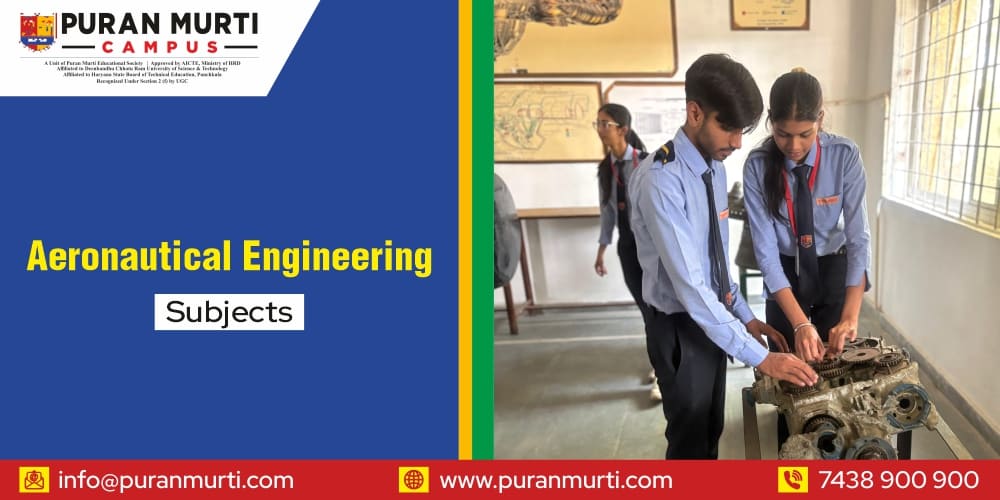Aeronautical Engineering Subjects
Posted on : 27 May, 2025 11:13 am
Have you ever looked up at an airplane and wondered how it flies? Or maybe you’ve been fascinated by the idea of designing your own aircraft? If that sounds like you, then aeronautical engineering subjects might be the perfect fit.
But what exactly do you study in this field? Let’s break it down in a way that’s easy to understand.
What is Aeronautical Engineering All About?
Aeronautical engineering is the branch of engineering focused on the science and technology of flight. It deals with designing, developing, and maintaining aircraft—everything from passenger jets to fighter planes.
This field is perfect for students who love physics, math, and machines—and who dream big.
Core Subjects in Aeronautical Engineering
Here’s a list of the main subjects you’ll come across during your four-year journey:
1. Aerodynamics
This subject teaches you how air flows around a plane. You’ll study lift, drag, pressure, and the forces that make flight possible.
Why it matters: Good aerodynamics can make an aircraft faster and more fuel-efficient.
2. Aircraft Structures
Here, you’ll learn how to design the “skeleton” of the aircraft. That includes understanding how wings, fuselage, and landing gear handle stress and strain.
Why it matters: A strong, lightweight design is key to a safe and successful flight.
3. Propulsion Systems
This subject explains how aircraft engines work—especially jet and turbine engines. You’ll learn how they generate the thrust needed to move a plane forward.
Why it matters: The engine is the heart of any aircraft. Without it, you’re not going anywhere!
4. Flight Mechanics
This one’s all about understanding how a plane behaves in the sky. You’ll study stability, control, and performance.
Why it matters: It helps you predict how the aircraft will respond to different situations in the air.
5. Avionics
Avionics deals with the electronic systems in an aircraft, such as navigation, radar, and communication tools.
Why it matters: Modern aircraft rely heavily on these systems for safe and efficient flights.
6. Aircraft Design
This subject brings everything together. You’ll work on designing a complete aircraft—from choosing materials to final shape and layout.
Why it matters: This is where creativity meets engineering logic. It’s what makes every aircraft unique.
7. Materials Science
In this subject, you’ll learn about the different materials used in aircraft—aluminum, titanium, carbon fiber, and more.
Why it matters: You can’t build a safe and durable aircraft without choosing the right materials.
8. Thermodynamics and Fluid Mechanics
These are core engineering subjects that explain how energy and air behave under different conditions.
Why it matters: These concepts are essential for understanding how engines and airflows work.
9. Computational Fluid Dynamics (CFD)
This involves using computer software to simulate how air moves around the aircraft.
Why it matters: It helps engineers test designs before building anything physically, saving time and money.
10. Aircraft Maintenance and Repair
This subject gives you hands-on knowledge about inspecting, servicing, and repairing aircraft.
Why it matters: Even the best-designed aircraft need regular checks to stay flight-ready.
Other Topics You May Encounter
Some colleges also offer electives or advanced subjects like:
-
Satellite technology
-
Drone design and development
-
Aerospace materials
-
Space mechanics
Not Just Theory—You Get Practical Experience Too!
Aeronautical engineering isn’t only about sitting in a classroom. You’ll get to work in labs, use wind tunnels, design small models, and even intern with top aviation companies. In your final year, you might even get a chance to work on a full aircraft design project.
Final Thoughts
If you’ve got a love for the skies and a passion for science and technology, aeronautical engineering could be your calling. The subjects may seem tough at first, but they’re the stepping stones to an exciting and high-flying career.
So, the next time you see a plane soaring overhead, remember—what you study today could help design the aircraft of tomorrow.

